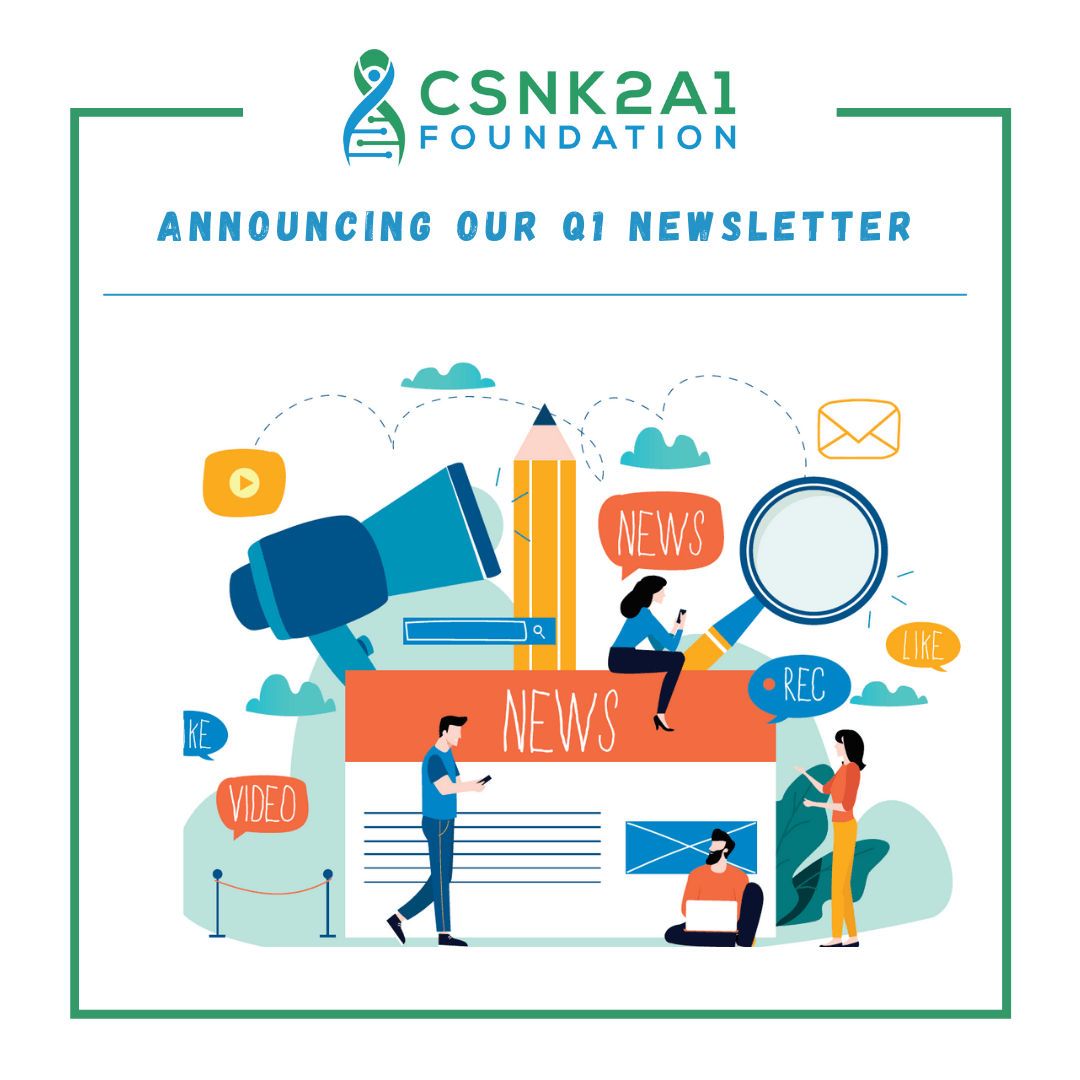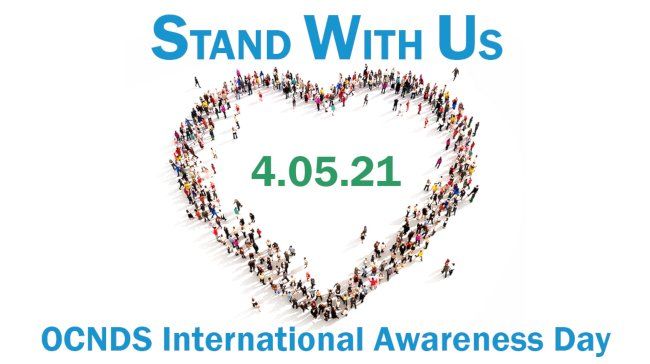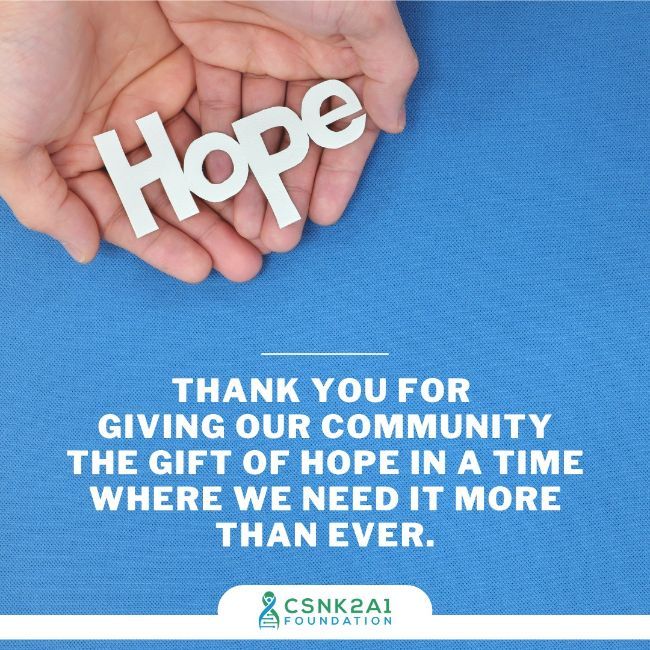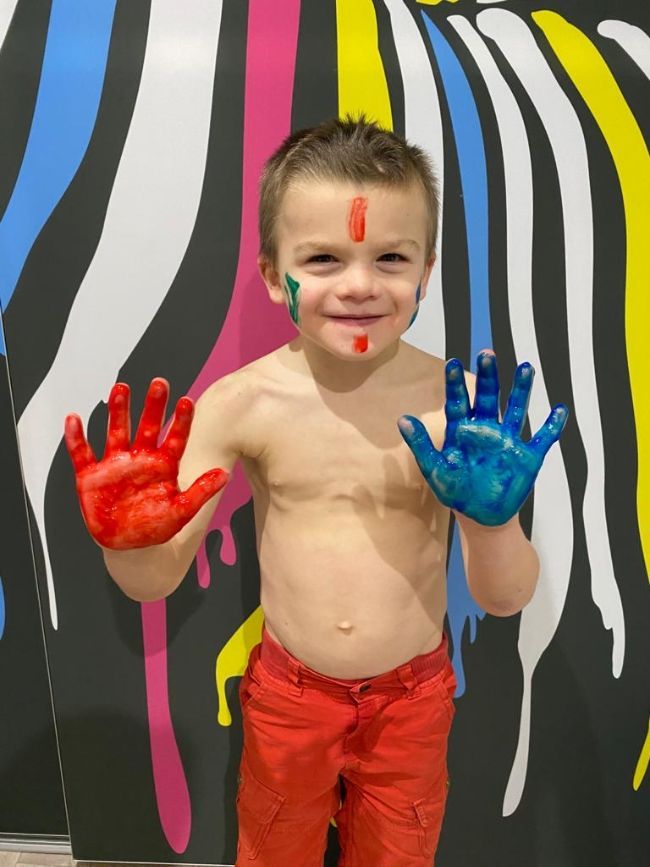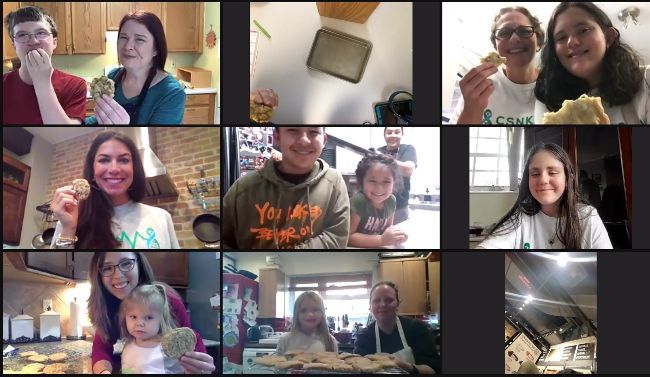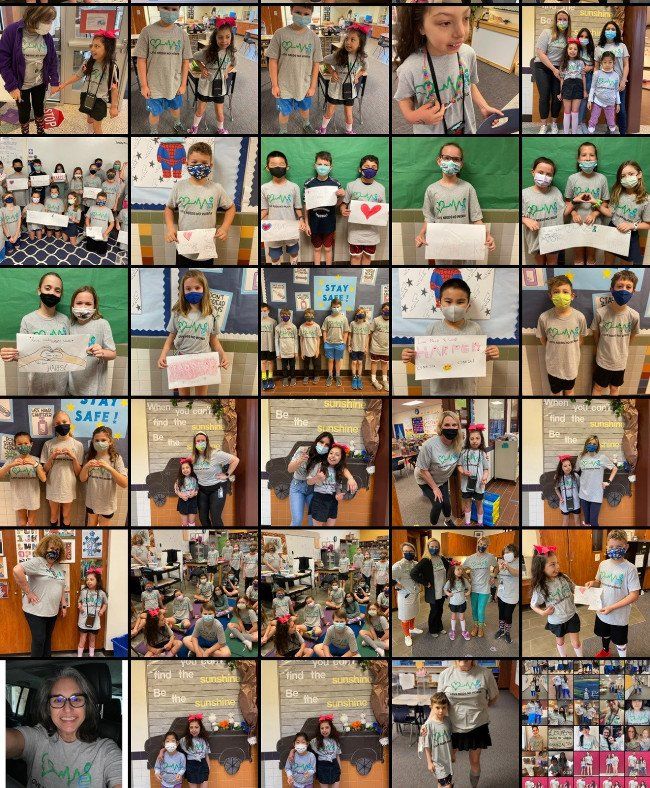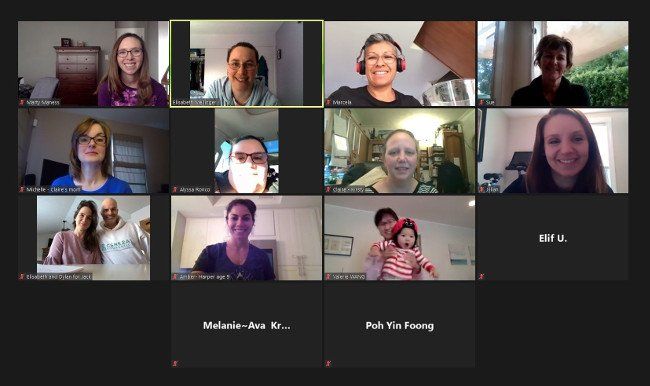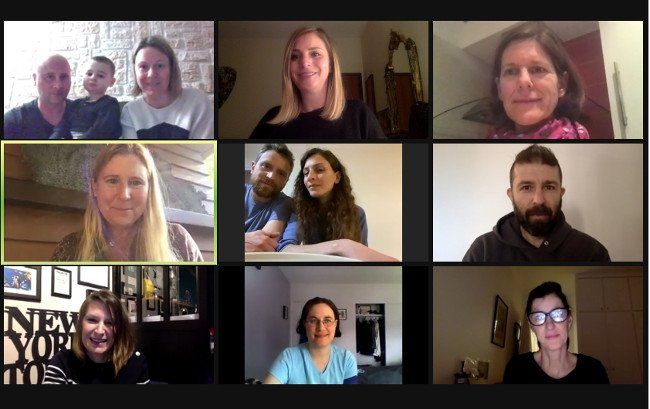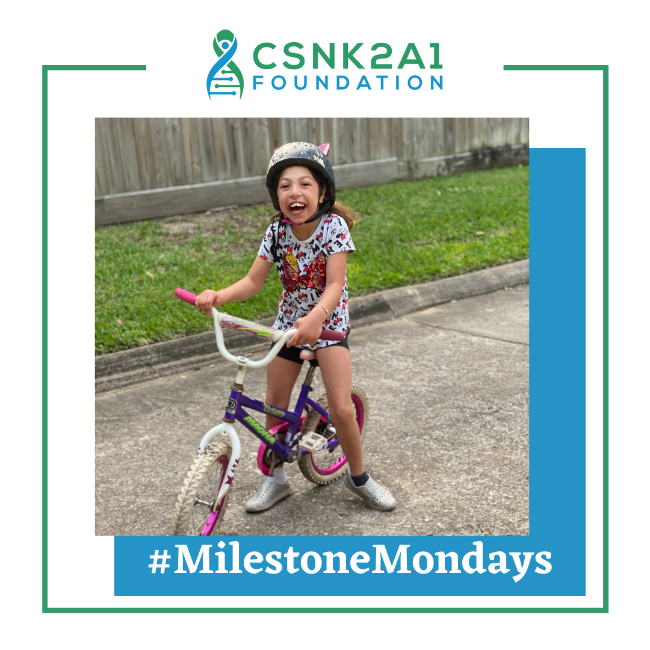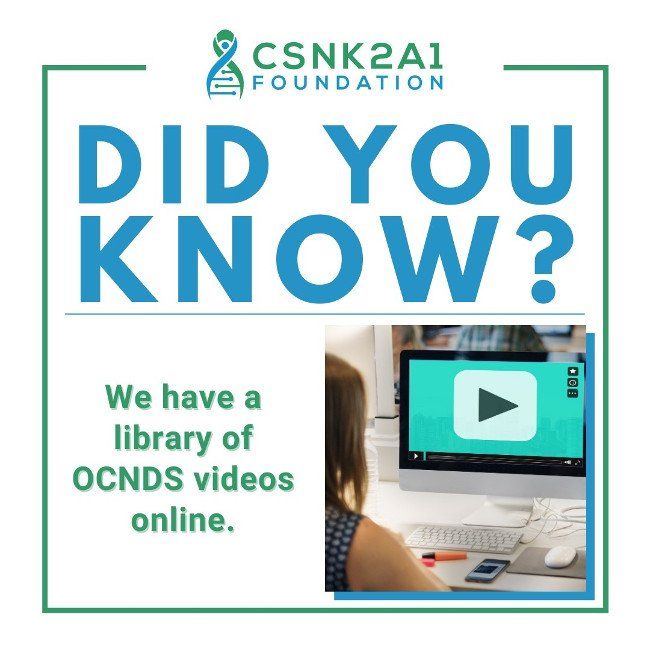Join us on social media April 5th for International OCNDS Awareness Day.
Why did we choose April 5th for our annual awareness day?
On April 5, 2016, 5 years ago, the first paper was published describing a brand new syndrome called Okur-Chung Neurodevelopmental Syndrome, also known as OCNDS. Initially, there were 5 children identified in the paper with OCNDS. Families searching for years finally had an answer, a diagnosis for the symptoms that plagued their loved one. Today, more than 160 individuals have been diagnosed with OCNDS.
Currently, when someone receives an OCNDS diagnosis they are told there is no treatment or cure. This is changing. OCNDS families are not only taking a seat at the table, providing real-life perspectives that are helping to shape the development of new treatments and therapies, they are the DRIVING FORCE behind OCNDS rare disease research.
Someone once said that “Nothing about Rare Disease is simple – not the diagnosis, not the daily care, not the long term.” On April 5th, we ask you to Stand with Us on this journey.
To Stand with Us, wear green or blue and tag us in your photos.
Final Total of Giving Tuesday
On December 1, 2020, the world was united by Giving Tuesday, a global day of giving. We launched our
Gift of Hope Campaign for Giving Tuesday
. Thank you to our donors and supporters, our Gift of Hope Campaign for Giving Tuesday was a huge success. We raised a total of $60,025.59 from Facebook, Instagram, online donations and mail-in donations. Facebook matched $226 in donations for our Gift of Hope fundraiser. Joan and Charlie Davis generously
matched
all donations made to the foundation for Giving Tuesday for a grand total of
$120,051.18
.
PAB & Needs Assessment Survey
We are excited to introduce our inaugural
Parent Advisory Board
(“PAB”). The PAB consists of 10 passionate parents from around the globe, representing the United Kingdom, the United States, Australia, Canada, and Austria.
Our Parent Advisory Board advises our Board of Directors, brainstorms ideas, and shares insights from the parent perspective related to OCNDS. Their Commitment: 1 year commitment with one year option to extend, Meeting Virtual Calls – 1 hour per month and 5 hours a month minimum for PAB projects. This group is extremely motivated and already completed their first project – an online Needs Assessment Survey for our community that will shape research and the direction of our foundation for years to come.
Rare Disease Day
Rare Disease Day
takes place on the
last day of February each year
. This year it fell on Sunday, February 28, 2021. The main objective of the campaign is to
raise awareness
amongst the general public and decision-makers about rare diseases and their impact on patients’ lives. The zebra is the official symbol of rare diseases in the United States and is noted for its black and white stripes, which are central to its uniqueness. Everyone has his/her own stripes, those characteristics that make each individual distinct. While each of the more than 7,000 rare diseases are unique, there are many commonalities that unite patients, families, caregivers and supporters. On 2/28, we united with over 300 million people worldwide living with a rare disease to work towards more equitable
access to diagnosis, treatment, care and social opportunity
.
A few families in our community shared their thoughts on what it means to be rare on Rare Disease Day. Read more below.
REFLECTION OF OCNDS PARENT ON RARE DISEASE DAY 2021
by Claire Whitehill
NOTRE PETIT SOLEIL
by Aurélie
I RUFF SOMEONE RARE
by Melanie Kretas / artwork by Ava
DAYS
by Rhiannon Cramer
LOVE NEEDS NO WORDS
by Amber Reynolds
Rare Disease Day Celebrations
On February 28, 2021, we hosted a Rare Disease Day 2021 Event with The Color-Coded Chef. Terri Jordan, founder of The Color-Coded Chef guided us through her amazing adapted Chocolate Chip Cookie recipe. Terri developed The Color-Coded Chef Kit which promotes life skills for all ages & abilities through the power of cooking. This unique system emphasizes visual communication. The carefully designed interface removes many of the traditional barriers of cooking. From the UK to Hawaii, families joined in the fun! A portion of the proceeds of the sale of the
Color-Coded Chef cooking kit
will be donated to CSNK2A1 Foundation if you use the code:
OCNDS
or
CSNK2A1 Foundation
.
Our PAB member, Amber Reynolds, created a new product line for her Rare Disease Day fundraiser “Love Needs No Words!” She raised over $1600 from her t-shirts sales. The “Love Needs No Words” product line is
now available in our items shop
and all the net proceeds are donated to OCNDS research. We loved seeing people all over the world wearing their shirts on Rare Disease Day.
Zoom Family Calls
The isolation and loneliness that come with having a child with a rare disease are suffocating. It is indeed rare to feel like someone else truly understands what it is like to care for someone who is rare. Finding a community can make all the difference in a rare disease journey. During these unprecedented times of COVID, it is even more important to stay connected. To keep our families connected, our PAB hosts quarterly Zoom calls to discuss a variety of topics ranging from epilepsy management to puberty to transitioning into adulthood. These calls serve as a lifeline for many families struggling with basic daily activities. Look out for our next call April 24th where PAB member Michelle Proctor-Simms will host a OCNDS family discussion about epilepsy and management.
February Family Zoom Call
Quarterly Science Roundtable
CSNK2A1 Foundation hosts a quarterly Scientific Roundtable to bring together researchers, clinicians and innovators to exchange ideas and accelerate the path towards treatment for OCNDS.
In February, we launched our Quarterly Scientific Roundtable. Our Scientific Advisory Board and 2 board members hosted 5 institutions and 7 foundation funded researchers to hear research updates and to discuss next steps. These roundtables play a vital role in setting our OCNDS research agenda. We are looking forward to our next roundtable on April 13th.
For information or inquiries about our Quarterly Scientific Roundtable, please email
research@csnk2a1foundation.org
.
Parent Education Webinar Series
In late 2020, we launched our Parent Education Webinar Series. As parents and patients try to navigate a new diagnosis, they can be overwhelmed with information. We want to provide informational videos to help parents and patients navigate their rare diagnosis and inform them about different types of interventions available. We are excited for
our next webinar on April 1st about Alternative Communication approaches and strategies
. We anticipate that this will be a well-attended event since inability to speak or severe speech delay is one of the hallmark symptoms of OCNDS. Caregivers and parents are always looking for ways to ease the frustration of those living with OCNDS and increase their ability to communicate their needs, wants, hopes and dreams.
#MondayMilestones Spotlight
Join us each Monday on social media when we celebrate #MilestoneMondays. We will highlight an individual living with OCNDS and celebrate a milestone that they have achieved. Those living with OCNDS have many daily challenges. Some challenges are as basic as swallowing, toileting, dressing themselves, putting on a seatbelt, and making friends. Individuals with OCNDS have to work harder than the average person to reach the smallest of milestones.
Recently, we celebrated Harper. Her family shared with us:
“Harper was diagnosed with OCNDS at 5 years old. She didn’t crawl until 14 months. She has always been delayed in every milestone. She works so hard to do simple tasks her peers can easily do without thinking about it. She reminds us to never give up! We celebrate every milestone because it is a reminder of how hard she has worked to get here. COVID-19 restrictions have given us more time to work on skills. And for the first time ever, Harper learned to ride a bike without training wheels at 8 years old. She loves riding her bike, and now does tricks, riding with one hand going up and down ramps and over curbs.”
Did you know we have
a library of OCNDS related videos
? When someone is diagnosed with OCNDS, most, if not all, health professionals have never heard of OCNDS. While triaging the day-to-day symptoms of OCNDS, patients and caregivers have the burden of educating themselves and health care providers about OCNDS. We are the first organization of its kind educating parents, caregivers, patients and health care professionals about OCNDS. We are continually creating videos to educate individuals about OCNDS. Go to our website where you will find a
video library
of the following types of videos: informational, research updates, awareness and conference. Watch and share with families, friends, providers and healthcare professionals. The more we know about OCNDS, the better advocates we can be for our loved one living with OCNDS. Join us every Wednesday on our social media channels for our
Did You Know series
.
Number of Patients Found in Q1
In the first quarter of 2021, we found 10 new families spanning the globe: Malaysia, Belgium, United States, Germany and Italy.
Research Opportunity – Simons Searchlight OCNDS Natural History Study
Have you ever wondered:
“What happens in adulthood for those living with OCNDS?”
“How many individuals with OCNDS have autism or autism behavior traits?”
“What is the average age that someone with OCNDS speaks?”
“How many individuals with OCNDS have epilepsy?”
“What do they do to manage their epilepsy?”
These are great questions which can’t be answered unless individuals and their families participate in the OCNDS/CSNK2A1 Natural History Study. Knowledge is power! OCNDS families can make a difference today by
signing up
for the CSNK2A1 Simons Searchlight Natural History Study! On Sunday, March 14, 2021, we had a Question & Answer session with CSNK2A1 Foundation and Simons Searchlight about our Natural History Study. Here is the
video from the Q&A
. To learn more visit
www.simonssearchlight.org
Are you interested in participating and would like to speak with an OCNDS parent on the Parent Advisory Board who is participating in the natural history study? If so, email us at
info@csnk2a1foundation.org
and we will facilitate the call.
If you want to sign up, but it feels overwhelming, join us on April 17th for a Zoom registration party where members of the
Parent Advisory Board
and a Simons Searchlight representative will provide support in the registration process.
Provider and Doctor Database
Do you love your provider? If so, we are building a list of doctors/providers for our OCNDS community. Please share their information with us at
info@csnk2a1foundation.org
so we can build our database.
How to get involved?
Have special skills or talents and would like to donate your time? There are many volunteer opportunities available at the Foundation. Email us at
volunteer@csnk2a1foundation.org
to get involved.
With knowledge comes acceptance. Help us bring awareness to OCNDS by sharing our content across social media. One easy way to get involved is to “like” our
Facebook page
and ask your friends to “like” our page. Follow us on
Twitter
,
Instagram
, and
Linkedin
.
Friends, family and providers can join our closed Facebook group to share ideas and learn more about OCNDS.
Join now
.
Coming Next
April 1st: Alternative Communication 101 Parent Education Webinar Events
Details & Registration
April 5th: International OCNDS Awareness Day (Wear Green or Blue & Stand With Us)
April 13th: Q2 Scientific Roundtable
April 15th: Australia/New Zealand Family Zoom Meet Up
April 17th: Simons Searchlight research registration Zoom party, details to follow
April 24th: Quarterly Family Zoom Call – Topic: Epilepsy and Management
Jul/Aug: Save the Date coming – Simons Searchlight Virtual CSNK2A1 Family Conference
